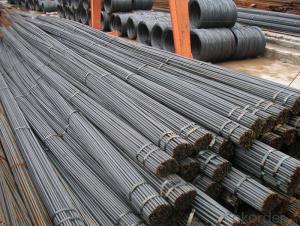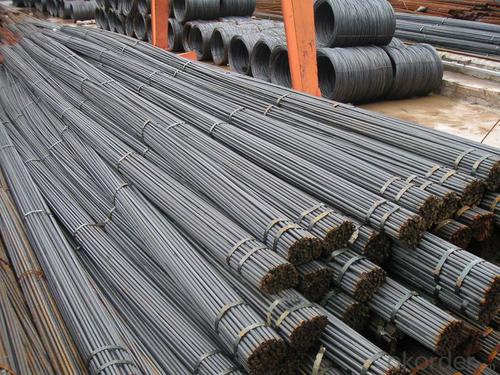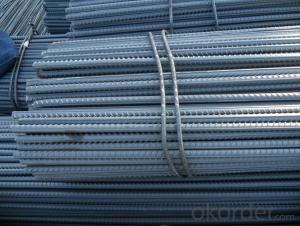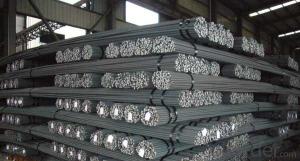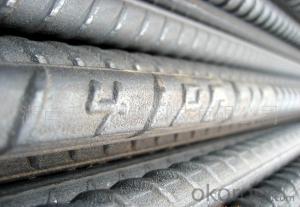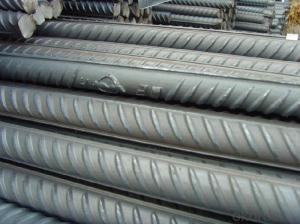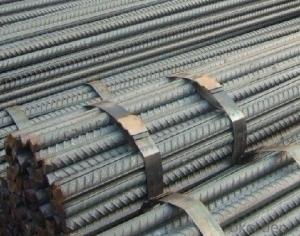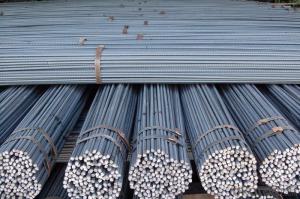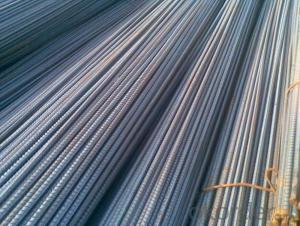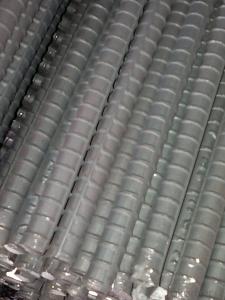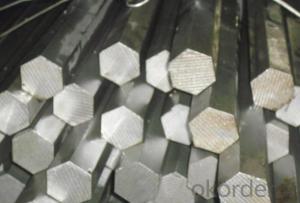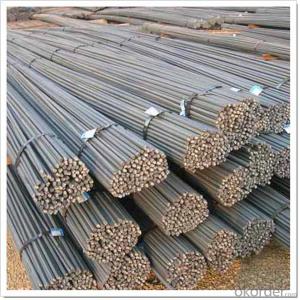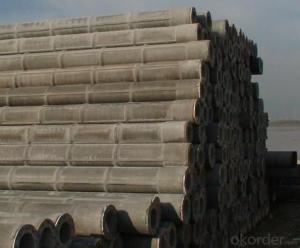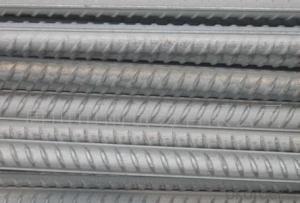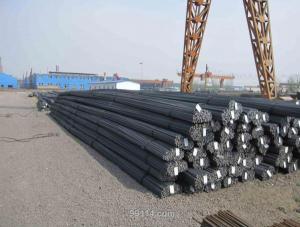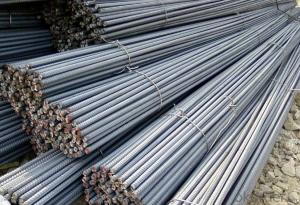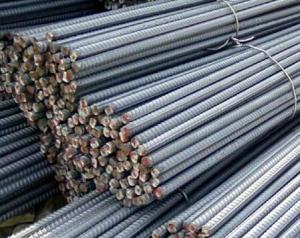Hot Rolled Carbon Steel Deformed Bar 14mm with High Quality
- Loading Port:
- China Main Port
- Payment Terms:
- TT or LC
- Min Order Qty:
- 25 m.t.
- Supply Capability:
- 20000 m.t./month
OKorder Service Pledge
OKorder Financial Service
You Might Also Like
Product Description:
OKorder is offering Hot Rolled Carbon Steel Deformed Bar 14mm with High Quality at great prices with worldwide shipping. Our supplier is a world-class manufacturer of steel, with our products utilized the world over. OKorder annually supplies products to European, North American and Asian markets. We provide quotations within 24 hours of receiving an inquiry and guarantee competitive prices.
Product Applications:
Hot Rolled Carbon Steel Deformed Bar 14mm with High Quality is widely used in buildings, bridges, roads and other engineering construction. Big to highways, railways, bridges, culverts, tunnels, public facilities such as flood control, dam, small to housing construction, beam, column, wall and the foundation of the plate, deformed bar is an integral structure material. With the development of world economy and the vigorous development of infrastructure construction, real estate, the demand for deformed bar will be larger and larger..
Product Advantages:
OKorder's Hot Rolled Carbon Steel Deformed Bar 14mm with High Quality are durable, strong.packed and suitable for construction
Main Product Features:
· Premium quality
· Prompt delivery & seaworthy packing (30 days after receiving deposit)
· Can be recycled and reused
· Mill test certification
· Professional Service
· Competitive pricing
Product Specifications:
Manufacture: Hot rolled
Grade: HRB335 HRB400 BS4449 Grade460 ASTM Grade40 Grade60
Certificates: ISO, SGS, BV, CIQ
Length:6m 8m 9m 12m
Packaging: Export packing, packed by coil
FAQ:
Q1: Why buy Materials & Equipment from OKorder.com?
A1: All products offered byOKorder.com are carefully selected from China's most reliable manufacturing enterprises. Through its ISO certifications, OKorder.com adheres to the highest standards and a commitment to supply chain safety and customer satisfaction.
Q2: How do we guarantee the quality of our products?
A2: We have established an advanced quality management system which conducts strict quality tests at every step, from raw materials to the final product. At the same time, we provide extensive follow-up service assurances as required.
Q3: How soon can we receive the product after purchase?
A3: Within three days of placing an order, we will begin production. The specific shipping date is dependent upon international and government factors, but is typically 7 to 10 workdays.
Q4: How many tons per bundle?
A4: Around 2-3tons
Q5: How to avoid the rust after deliver the goods to the loading port?
A5: We will keep the goods at the port covered with water-proof material
Q6: What is the chemical composition and physical properties of HRB400?
A6
Grade | Technical data of the original chemical composition (%) | ||||||
C | Mn | Si | S | P | V | ||
HRB400 | ≤0.25 | ≤1.60 | ≤0.80 | ≤0.045 | ≤0.045 | 0.04-0.12 | |
Physical capability | |||||||
Yield Strength (N/cm²) | Tensile Strength (N/cm²) | Elongation (%) | |||||
≥400 | ≥570 | ≥14 | |||||
Q7:What is chemical composition and physical properties of 500B?
A7:
BS4449 500B | Chemical Composition | ||||
C | Mn | Si | S | P | |
0.24 | 0.45 | 0.16 | 0.05 | 0.31 | |
Physical capability | |||||
Yield Strength(N/cm²) | Tensile Strength(N/cm²) | Elongation (%) | |||
650 | ≥500 | 19 | |||
Images:
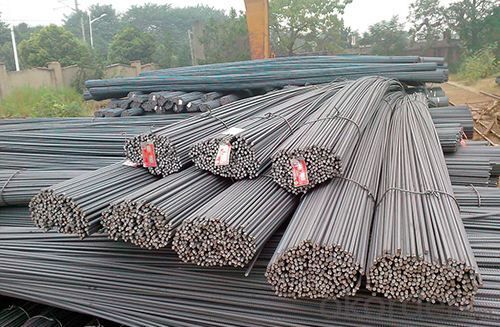
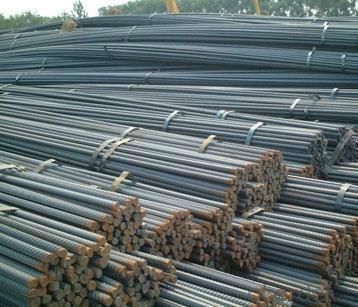
- Q: Are steel rebars suitable for use in high-temperature applications?
- Steel rebars are generally not suitable for use in high-temperature applications. Although steel is a strong and durable material, it has limitations when exposed to high temperatures. At elevated temperatures, steel can undergo significant reduction in strength and may even experience a loss of structural integrity, leading to potential failures. When steel is exposed to high temperatures, it undergoes a process called thermal expansion, which can cause it to weaken and deform. This phenomenon is particularly prominent in rebars, which are often used as reinforcements in concrete structures. The high temperatures can cause the rebars to expand and exert excessive pressure on the surrounding concrete, leading to cracks and potentially compromising the structure's stability. Additionally, prolonged exposure to high temperatures can result in a loss of the steel's mechanical properties, including tensile strength and load-bearing capacity. This can significantly reduce the rebars' ability to resist external forces and effectively reinforce the concrete. Therefore, it is generally recommended to use alternative materials, such as stainless steel or special alloys, for high-temperature applications. These materials are specifically designed to withstand elevated temperatures without losing their structural integrity. It is important to consult with experts and engineers familiar with high-temperature applications to determine the most suitable materials for specific projects to ensure safety and structural stability.
- Q: Do l 8, three grade steel have discs?
- If small specifications or hot rolled straight line, the cost is high, not to say, production is still low, the general steel mills in order to produce the production of discoid small threads, and then according to the needs of the use of mechanical processing into a straight bar shape
- Q: How are steel rebars specified in construction drawings?
- The combination of symbols, labels, and dimensions is used in construction drawings to specify steel rebars. These specifications give detailed information about the rebars' size, shape, and placement within the concrete structure. Typically, the specifications for steel rebars include: 1. Rebar Size: The diameter of the rebar is indicated by a numerical value, such as 8, 10, 12, etc., representing millimeters or inches. 2. Rebar Shape: Symbols or abbreviations, like "D" for deformed or "SD" for smooth and deformed, are used to denote the rebar's shape. 3. Rebar Spacing: The distance between adjacent rebars is specified numerically, such as 150, 200, or 300, in millimeters or inches. 4. Rebar Bending: If bending is required, the construction drawings will include details of the angle, radius, and location of the bend. 5. Rebar Placement: Plans, sections, and elevations in the construction drawings show the precise location and arrangement of the rebars. These drawings provide information on the number of rebars, their orientation, and their position relative to other elements of the structure. 6. Rebar Schedule: A tabular rebar schedule is often provided, summarizing all the specifications for each rebar element. This includes the rebar mark, size, length, weight, and any special instructions. In conclusion, the specifications in construction drawings ensure that steel rebars are fabricated, installed, and integrated correctly into the concrete structure. This ensures the building meets design requirements, maintaining its structural integrity and safety.
- Q: How do steel rebars affect the overall construction timeline?
- Steel rebars can significantly impact the overall construction timeline. Their presence ensures the structural integrity and strength of concrete structures, such as buildings and bridges. However, the installation, positioning, and securing of rebars can be time-consuming and require meticulous planning and coordination. Any delays or errors in rebar installation can potentially slow down the construction process, impacting the timeline. Therefore, it is crucial to efficiently manage the procurement, fabrication, and installation of rebars to keep the construction timeline on track.
- Q: Are there any disadvantages of using steel rebars?
- Yes, there are a few disadvantages of using steel rebars. Firstly, steel rebars are susceptible to corrosion when exposed to moisture and certain chemicals, which can weaken the structure over time. Additionally, steel rebars are relatively heavy, making them challenging to transport and handle on construction sites. Lastly, steel rebars can be more expensive compared to alternative materials, which could increase the overall cost of a construction project.
- Q: What is the impact of steel rebars on the overall thermal performance of a building?
- Steel rebars have a minimal impact on the overall thermal performance of a building. While steel has a relatively high thermal conductivity, the small cross-sectional area of rebars compared to the overall building envelope limits their ability to transfer significant amounts of heat. Additionally, rebars are typically embedded within concrete, which acts as a thermal mass and helps regulate temperature fluctuations. Therefore, the impact of steel rebars on the building's thermal performance is generally insignificant.
- Q: Can steel rebars be used in swimming pool construction?
- Yes, steel rebars can be used in swimming pool construction. Steel rebars are commonly used as reinforcement in concrete structures, including swimming pools, to provide additional strength and structural integrity.
- Q: What is the cost of steel rebars per ton?
- The cost of steel rebars per ton can vary depending on several factors such as market conditions, supplier, quality, and location. It is recommended to consult with local suppliers or check current market prices for accurate and up-to-date information.
- Q: How do steel rebars affect the overall crack resistance of concrete structures?
- Steel rebars significantly improve the crack resistance of concrete structures. By reinforcing the concrete, rebars help distribute and absorb tensile forces, preventing the formation and propagation of cracks. This reinforcement enhances the overall strength and durability of the concrete, making the structure more resistant to cracking under various loads and environmental conditions.
- Q: Are steel rebars resistant to lightning strikes?
- No, steel rebars are not inherently resistant to lightning strikes.
Send your message to us
Hot Rolled Carbon Steel Deformed Bar 14mm with High Quality
- Loading Port:
- China Main Port
- Payment Terms:
- TT or LC
- Min Order Qty:
- 25 m.t.
- Supply Capability:
- 20000 m.t./month
OKorder Service Pledge
OKorder Financial Service
Similar products
Hot products
Hot Searches
Related keywords
